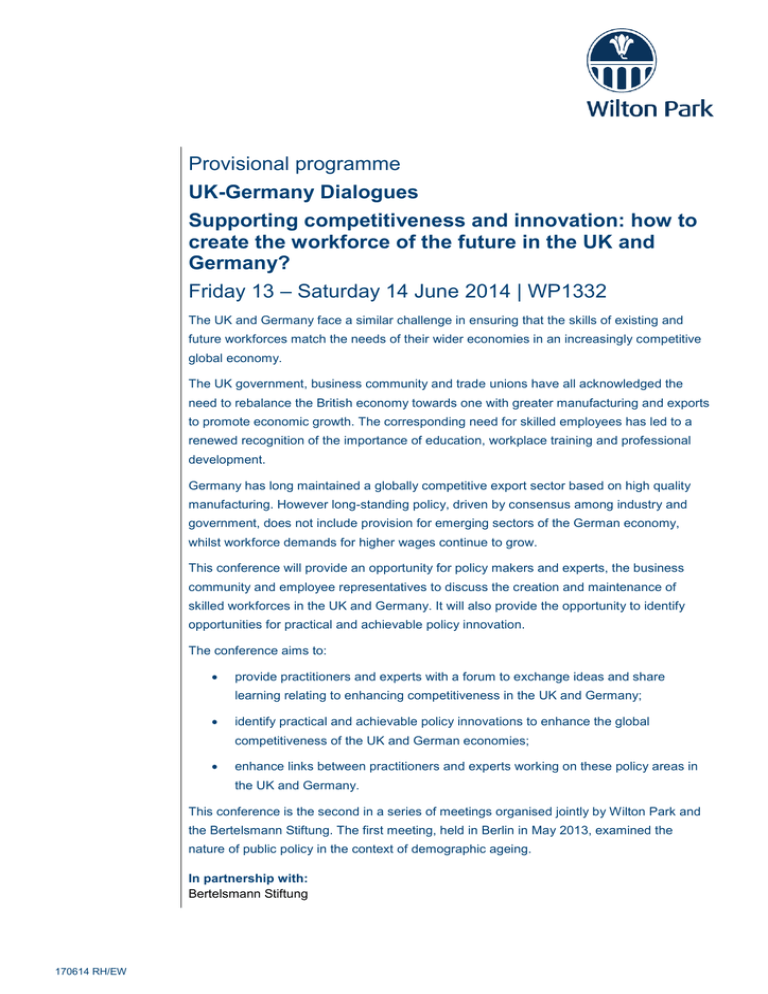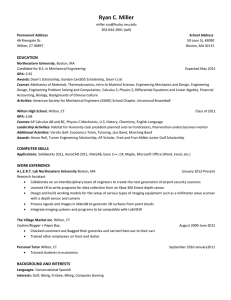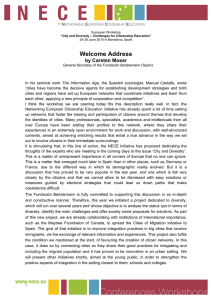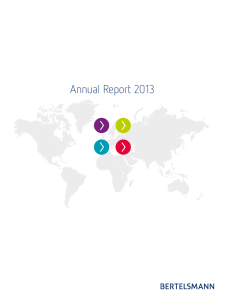UK-Germany Dialogues Supporting competitiveness and innovation: how to
advertisement

Provisional programme UK-Germany Dialogues Supporting competitiveness and innovation: how to create the workforce of the future in the UK and Germany? Friday 13 – Saturday 14 June 2014 | WP1332 The UK and Germany face a similar challenge in ensuring that the skills of existing and future workforces match the needs of their wider economies in an increasingly competitive global economy. The UK government, business community and trade unions have all acknowledged the need to rebalance the British economy towards one with greater manufacturing and exports to promote economic growth. The corresponding need for skilled employees has led to a renewed recognition of the importance of education, workplace training and professional development. Germany has long maintained a globally competitive export sector based on high quality manufacturing. However long-standing policy, driven by consensus among industry and government, does not include provision for emerging sectors of the German economy, whilst workforce demands for higher wages continue to grow. This conference will provide an opportunity for policy makers and experts, the business community and employee representatives to discuss the creation and maintenance of skilled workforces in the UK and Germany. It will also provide the opportunity to identify opportunities for practical and achievable policy innovation. The conference aims to: provide practitioners and experts with a forum to exchange ideas and share learning relating to enhancing competitiveness in the UK and Germany; identify practical and achievable policy innovations to enhance the global competitiveness of the UK and German economies; enhance links between practitioners and experts working on these policy areas in the UK and Germany. This conference is the second in a series of meetings organised jointly by Wilton Park and the Bertelsmann Stiftung. The first meeting, held in Berlin in May 2013, examined the nature of public policy in the context of demographic ageing. In partnership with: Bertelsmann Stiftung 170614 RH/EW Friday 13 June 1200 onwards Participants arrive 1230 Buffet lunch 1330-1345 Welcome and introduction Robin Hart Programme Director, Wilton Park, Steyning Andreas Esche Director, Shaping Sustainable Economies Programme, Bertelsmann Stiftung, Gütersloh 1345-1500 1. Creating skilled workforces: the challenges and opportunities for the UK and Germany How are the UK and Germany approaching the longer term challenges of competing with the emerging economies? To what extent should the UK and Germany support their main economic sectors? What has enabled the UK to become a major exporter of services and encourage innovation? How does the UK develop an industrial strategy that boosts manufacturing exports? How does Germany plan to boost its service sector? What makes the high quality manufacturing sector of Germany so competitive? Session Chair: Robin Hart Director of Programmes, Wilton Park, Steyning The global context Paola Subacchi Research Director, International Economics, Chatham House, London Stefan Georg Chairman, Delta Economics, London The UK and German context Werner Eichhorst Director, International Labour Policy, Institute for the Study of Labour (IZA), Bonn Lesley Giles Deputy Director, Research and Technical, UK Commission for Employment and Skills, London 1500-1520 Tea/coffee 1520-1625 2. Where will future jobs be created? What are the jobs of the future? What impact on the labour force of developments for example in 3-D printing or Industry 4.0? What skills will be needed for such developments? How to encourage start-up companies to grow and provide employment? Where can the UK and Germany learn from each other and share opportunities in innovation? What about the future of low-skilled transactional jobs? Session Chair: Andreas Esche Director, Shaping Sustainable Economies Programme, Bertelsmann Stiftung, Gütersloh Belinda Johnson Owner and Director, WorkLab, Reading Carl-Ernst Forchert Managing Director, i-vector Innovationsmanagement GmbH, Berlin Ivor Parvanov Managing Director, Social and Societal Policy, Bavarian Industry Association, Munich 1630-1735 3. The employer’s and employee’s perspectives: what sort of workforce will be needed for competitiveness? Looking to the future, what kind of employee will major businesses in critical economic sectors in the UK and Germany need to recruit? What skills and competencies will the workforce need? What is the division of labour between the public and private sectors in creating this workforce? What policies, strategies and initiatives might further this? What can be learnt from current best practices in each country? How to further encourage a climate of entrepreneurship in both countries? Session Chair: Robin Hart Director of Programmes, Wilton Park, Steyning The employer’s perspective Tim Wenniges Head of Staff Unit, Governmental Affairs; Head of Unit, Higher Education Policy, The Baden-Wuerttemberg Employers’ Association of the Metal and Electrical Industry (Südwestmetall), Stuttgart The employee’s perspective Kay Carberry Assistant Secretary General, Trades Union Congress, London Hans Ulrich Nordhaus Head of Unit, Department of Educational Policy and Work, German Confederation of Trade Unions (DGB), Berlin 1735-1800 Photograph followed by tea/coffee 1800-1900 4. Creating the workforce of the future: education, training and professional development What can the UK and Germany learn from each other about creating skilled workforces through education, vocational and professional training? How to encourage entrepreneurs? How to empower women in business? Session Chair: Andreas Esche Director, Shaping Sustainable Economies Programme, Bertelsmann Stiftung, Gütersloh Education and skills Eric Thode Senior Expert, Bertelsmann Stiftung, Gütersloh Nicola Dandridge Chief Executive, Universities UK, London Eliot Bendinelli Project Manager, ThinkYoung, Brussels 1930 Reception 2000 Dinner Dinner discussion on skills and employment Hosted by: Iain Ferguson Chairman, Wilton Park, Steyning Speaker: David Willetts Minister for Universities and Science, Department for Business, Innovation and Skills (BIS), London Saturday 14 June 0800 onwards Breakfast 0845-0945 5. Breakfast discussion Skilled workforces of the future - innovations for the future What innovations to policies and practices are necessary to ensure that the UK and Germany have appropriately skilled workforces? What are the blocks and challenges to bring about such innovations? What lessons can the UK and Germany transfer when undertaking reforms? Short interventions by speakers to initiate discussion Session Chair: Iain Ferguson Chairman, Wilton Park, Steyning Christopher Warhurst Director, Institute for Employment Research, University of Warwick, Coventry Wolfgang Müller Director, European Representation, Federal Employment Agency, Brussels 0945-1000 6. Final reflections Drawing on key issues raised in the roundtable discussions to identify policy and strategy implications for the future. 1000 Participants depart






